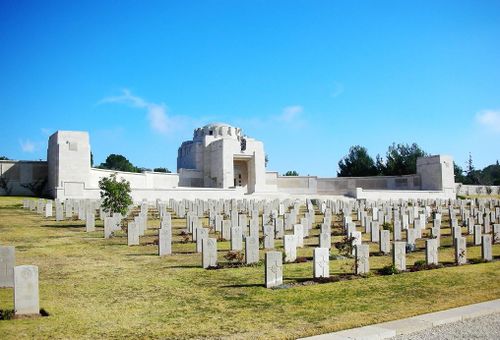Difference between revisions of "Jerusalem Memorial"
From Our Contribution
(→Soldiers) |
|||
| Line 6: | Line 6: | ||
| subheader = | | subheader = | ||
| − | | image = [[File:Jerusalem_Memorial_&_Cemetery.jpg| | + | | image = [[File:Jerusalem_Memorial_&_Cemetery.jpg|500px|]] |
| caption = | | caption = | ||
| image2 = | | image2 = | ||
| Line 44: | Line 44: | ||
==Soldiers== | ==Soldiers== | ||
| − | * | + | *Tpr [[Cyril Augustest Tonkin]] |
[[Category:Monuments and memorials]] | [[Category:Monuments and memorials]] | ||
Latest revision as of 16:19, 24 December 2017
 | |
| Monument Details | |
|---|---|
| Name | Jerusalem War Memorial |
| Location | East Jerusalem |
| Dedication Date | 7 May 1927 |
History
Jerusalem War Cemetery was begun after the occupation of the city, with 270 burials. It was later enlarged to take graves from the battlefields and smaller cemeteries in the neighbourhood. There are now 2,514 Commonwealth burials of the First World War in the cemetery, 100 of them unidentified. Within the cemetery stands the JERUSALEM MEMORIAL, commemorating 3,300 Commonwealth servicemen who died during the First World War in operations in Egypt or Palestine and who have no known grave. The memorial was designed by Sir John Burnet, with sculpture by Gilbert Bayes. In addition, the mosaic in the Memorial Chapel was designed by Robert Anning Bell. The Memorial was unveiled by Lord Allenby and Sir James Parr on 7 May 1927.
Setting
Description
3,315 identified casualties from WW1 are housed in the cemetery.
Monument Details
Title Jerusalem Memorial